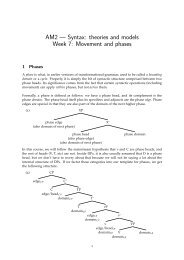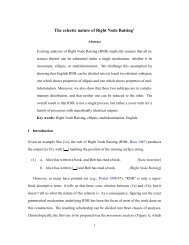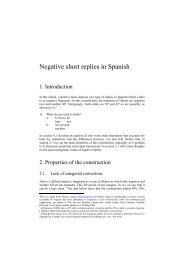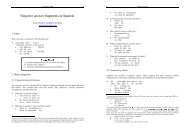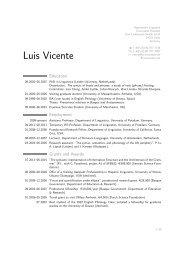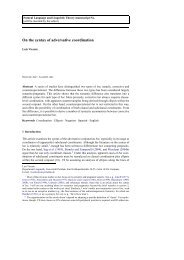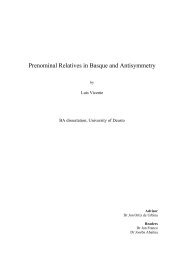Verb fronting in Mandarin Chinese - Luis Vicente
Verb fronting in Mandarin Chinese - Luis Vicente
Verb fronting in Mandarin Chinese - Luis Vicente
You also want an ePaper? Increase the reach of your titles
YUMPU automatically turns print PDFs into web optimized ePapers that Google loves.
Cheng & <strong>Vicente</strong><br />
<strong>Verb</strong> <strong>front<strong>in</strong>g</strong> <strong>in</strong> Mandar<strong>in</strong><br />
UCSC L<strong>in</strong>guistics Colloquium<br />
October 31, 2008<br />
• In verbal lian...dou, the presence of negation is obligatory, as opposed to (a) other types of<br />
lian...dou, and (b) verbal clefts.<br />
(33) * ta lian kan dou<br />
he lian read dou<br />
“He even looked”<br />
kan<br />
read<br />
We don’t have anyth<strong>in</strong>g <strong>in</strong>terest<strong>in</strong>g to say about this property (yet).<br />
• The lower copy of the verb cannot be followed by any verbal dependents, which have to be<br />
left-dislocated. This effect is much stronger than it is <strong>in</strong> verbal clefts.<br />
(34) a. * ta lian kan dou mei kan zhe-ben<br />
he lian read dou not.have read this.cl<br />
“He didn’t even read this book”<br />
shu<br />
book<br />
b. ̌ zhe-ben shu ta lian kan dou mei kan<br />
this.cl book he lian read dou not.have read<br />
“This book, he didn’t even read (it)”<br />
3.2 <strong>Verb</strong>al lian...dou requires movement<br />
3.2.1 Argument for movement #1: locality effects<br />
In the same way as with verbal clefts, verbal lian...dou dependencies can span f<strong>in</strong>ite clause boundaries,<br />
but they are blocked by <strong>in</strong>terven<strong>in</strong>g island boundaries.<br />
(35) lian kan wo xiangx<strong>in</strong> [ CP ta dou mei kan]<br />
lian see I believe he dou not.have look<br />
“I believe that he didn’t even look”<br />
(36) a. * lian kan wo zhidao [ CP ta weishenme dou mei kan]<br />
lian look I know he why dou not.have look<br />
“I know why he didn’t even look”<br />
b. * lian kan ta bei che zhuang-le [ ADJ y<strong>in</strong>wei ta dou mei kan]<br />
lian look he by car hit.asp because he dou not.have look<br />
“He was hit by a car because he didn’t even look”<br />
This contrast shows that the dependency between the two copies of the verb is mediated by an A-bar<br />
cha<strong>in</strong>.<br />
3.2.2 Argument for movement #2: lexical identity effects<br />
In the same way as with verbal clefts, the two copies of the verb <strong>in</strong> verbal lian...dou must consist<br />
of the same lexical item. The follow<strong>in</strong>g sentences are not counterexamples, s<strong>in</strong>ce they get a concessive/conditional<br />
read<strong>in</strong>g different from the focus read<strong>in</strong>g characteristic of verbal lian...dou.<br />
(37) a. lian lüx<strong>in</strong>g wo dou bu zuo feiji<br />
lian travel I dou not sit airplane<br />
“I won’t even fly if I’m travell<strong>in</strong>g”<br />
b. lian xiayu wo dou bu da yusan<br />
lian ra<strong>in</strong> I dou not hit umbrella<br />
“I won’t even carry an umbrella if it’s ra<strong>in</strong><strong>in</strong>g”<br />
8 of 13



